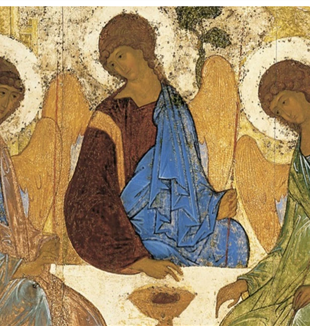
The Gift of Unity
Seeking to understand how to "become a presence," Hannah goes back to charitable work. An answer appears in a look of tenderness.What is the Christian in the world? “One who brings to the world that for which the world is waiting and which it does not know: Christ...The duty that emerges for the Christian, for the presence of the Christian in the world, is to bring about communion.” (The Life of Luigi Giussani, 430).
After reading all of the Diaconia contributions, it is clear to me that our belonging to each other is not generated by us, but is a gift. This is for me the starting point for living this moment, because my experience of belonging to the Fraternity is the possibility of an “impossible unity”: the fact that our belonging together exists not so that we pat each other on the back with all of our agreements and judgments, nor that we compromise on all of our disagreements, but solely for the sake that we bear witness to the fact that the principle of our unity is Jesus Christ.
The question I have in these days is: how do I “bring about communion” amidst all of the human fragility and drama we are experiencing both personally and collectively? Fr. José said a "presence" is needed, and I think this is true—that a new or more perfect system is not the answer we are truly looking for, but rather that in order to change the world, we must ourselves begin to change.
So, what brings about this change in me? What does it mean to be a "presence" or to be "moved by a presence"? What am I actually being moved by? And what does my personal change have to do with the world?
From the work on the School of Community and chapter fifteen of the The Life of Luigi Giussani, I am beginning to see that a change in me only happens by being assimilated into Jesus Himself, only by living the reality of my baptism. Only then can I begin to generate a new kind of unity in the world--not a unity born from a cohesive set of ideas or a perfect system that we agree to operate and faithfully live within, but a unity that is born from a recognition of our collective need (for grace, for forgiveness) and a recognition that the only response to this collective need is the announcement of salvation: Jesus Christ’s death and resurrection.
I was totally surprised when I read how Fr. Giussani, when asked how to help promote the desire for the liberation of man and of society during the protests of ‘68, said, "The more we edify the Church the more we will contribute to the true liberation of the world." And he added, "Multiply. . . the Christian community" because "this is our contribution to our fellow man” (quoted on 422).
I desire to be in the world as a “presence”—the kind that Fr. José mentions, the kind that Daryl Davis is—but unless my starting point for understanding myself is that I want to be united to Christ, I always run the risk of understanding “presence” as proposing myself. But instead of proposing myself, Fr. Giussani insists that “the Christian proposal corresponds to a human reality present in the world around us. This proposal has a face, and when we fail to consider it, we betray the proposal. This face is the community of the Church.”
I can humanly only be a presence insofar as I allow myself to be taken up by the unity of God that precedes and sustains me and insofar as I am willing to go deep into the tradition of Christianity and all of the creative ways the Church proposes that we engage with all of reality. It is striking to me how clear it was for Father Giussani that a “presence” that brings about communion in the world can only do so because it is first in communion with God.
In these weeks, I went for the first time in years to do charitable work. It surprised me that it was immediately clear to me that the only way that I, in my particularity of being a stay-at-home mom with two small children, can help the world now is to offer all of myself for the whole world, for God to use however He wants. But I do not understand or live well what it means to offer, so I saw that I need to grow in this, and that this is why charitable work is proposed to us.
It was a very simple work—gathering items that have been donated and giving them to the sisters to give to the people coming and asking for help. One of the people who came was a seventeen-year-old pregnant girl. The sisters looked at her with so much tenderness and love, gifting her a special basket for women close to giving birth, with practical and beautiful donated items for the baby and self-care items for the mom. The sisters embodied exactly what Giussani says in the booklet on charitable work: “The supreme law of our being is to share in the being of others, to live in communion. . . . We do charitable work to live like Christ.”
Read also - Venezuela: To live without anesthesia
I want to go back to stay with these sisters. I want to grow in seeing what Fr. Giussani sees--that in order to live my “duty” as a Christian in the world, I first have to see more and more what it means to belong to Christ, to live in communion. This is why I really need this companionship--this friendship--this “tactile Reality” (Risk of Education, 74)! Because ultimately the point of this friendship is union with Jesus: identifying myself, merging, becoming one with Him.
Hannah, Covington, Kentucky